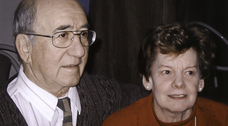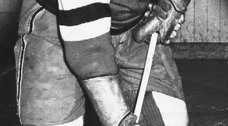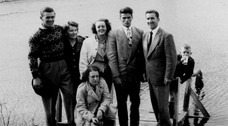2011-02-22
Luc Gagnon is a psychoeducator at the Douglas Institute. In 2003, he learned that his father had Alzheimer's disease. He decided to keep a journal to record the few precious lucid moments that his father would still be able to share. Two years later, Luc gathered his writings under the title "Papa, mama, the maid and I," a collection filled with humour and tenderness. The series is being published during the Alzheimer Awareness Month and over the next few weeks.

September 2004 - It’s the fourth evening that papa’s been in the emergency overflow unit. And it’s been a surprisingly enjoyable evening, despite the less than ideal surroundings. The atmosphere is calm; people are talking in hushed tones. Papa and I have been quietly chatting about this and that. But suddenly he changes gears and starts to recount his old hockey stories—for about the three-thousandth time. He’s rattled on about his hockey days for years—since long before the Alzheimer’s set in.
No problem, I think to myself, whatever brings him pleasure. What else is there to do here to pass the time? “Did I already tell you about this, did I already tell you about that?” Once again I hear about his special permission to play when he was a soldier stationed out west. Once again I hear how he was the favourite player of the colonel. Once again I hear about the after-game chatter at the monastery, where he worked as kitchen help under an assumed name to avoid serving on the front lines and where the monks drafted him for their team: Dishwasher 8, Students 2. Once again I hear about the Jonquière Aces. And once again I hear about the Sydney Millionaires. My father was quite the hockey player, as you’ve no doubt noticed.
| Maurice Richard (left); papa (right, with black tie), Or as they would have put it, Maurice on right wing and papa on left wing. |
Then, as it always does, the conversation turns to Maurice Richard. They were the same age and grew up in the same neighbourhood in Bordeaux. At 15 and 16, they played hockey with one another, papa shooting right and playing left wing, Maurice shooting left and playing right wing—the move that made his career—and Lucien Baillargeon playing centre.
This time, however, papa tells me more. He talks about weekday afternoons when he and Maurice had no school and headed to the local outdoor rink to play one-on-one. He talks at length about the fun they had, fooling around on the ice as kids do, trying to steal the puck off one another. It’s the first time I’ve ever heard him go into such detail.

Then, I lose him. It’s as if he’s looking at something far off over my shoulder, and it’s not the look I see when he’s adrift in his world of Alzheimer’s. It’s the look we all get when we delve into a memory of something distant and wonderful. And he says, with a sigh and a slight nod, “Man, I loved playing hockey.” This too is a first. He’s no longer the buddy of Maurice Richard; he’s just himself and simply enjoying the moment. He’s an 81-year-old kid lying on a stretcher in the emergency overflow area, smiling, perfectly content…and not a bit confused. He’s not saying “I want to go play hockey,” or “I’m off to the rink.” No, he’s just saying “Man, I loved playing hockey.” Now that’s my father.
As I think about it more, it strikes me that the Alzheimer’s may be making him forget his usual approach to telling stories. It’s as if he can no longer robotically recite the stories he’s told countless times, so he now has to go back to the source…back to the rink, his toes freezing in his skates, playing one-on-one with his pal on an outdoor rink in Bordeaux.
That’s life
Papa is finally in a room. We’ve left the overflow area. Of course it’s not a private room; he’s sharing it with three others. But it’s made a world of difference in terms of space and comfort.
I’m visiting, and I suggest to papa that we do a crossword puzzle. I quietly read him the clues so as not to disturb the other patients. After a few minutes, the woman lying on her bed next to him says, “Could you speak up a bit please, I can’t hear you, and I want to try to find the answers too.” So I raise my voice. The woman is not too good at guessing the words, but her attempts are genuine and she’s thrilled when she finally gets one right, even though it only happens once.
Next thing we know, other words are being suggested, as first a woman’s voice and then a man’s toss out guesses from behind a curtain. The patient at the far end of the room also joins in, as does his wife who’s come to visit him. The room is suddenly buzzing with voices. The nurse, who has been going back and forth between her station and the room with meds for the patients and who has not said a word until now, announces that she’s checked the medical dictionary at the nursing station, and the word pinocytosis, as suggested by papa, is correct.
So much for trying not to disturb the others; I’ve created a monster, and I have to smile. Life simply has a way of barging in on us.
Read the last chapter of Luc Gagnon's story



